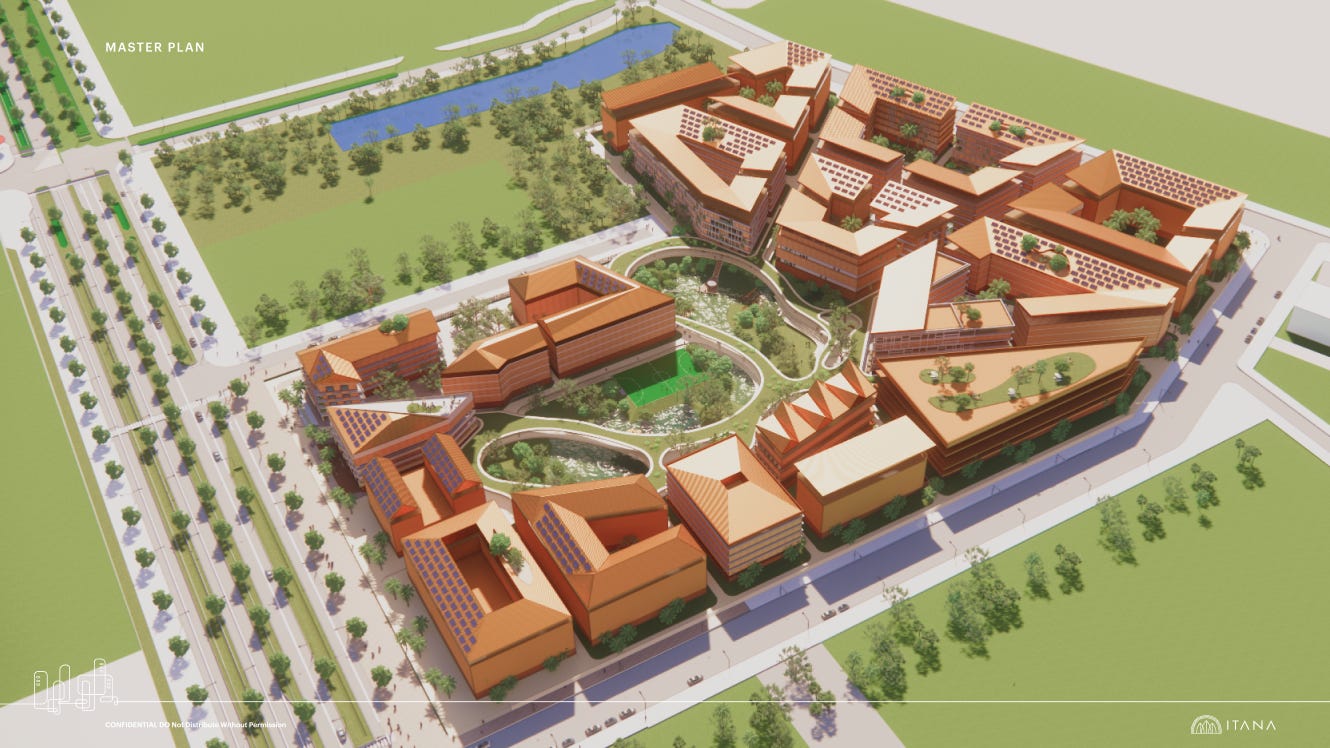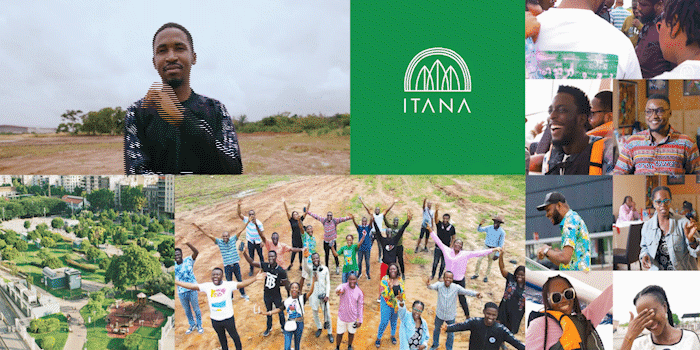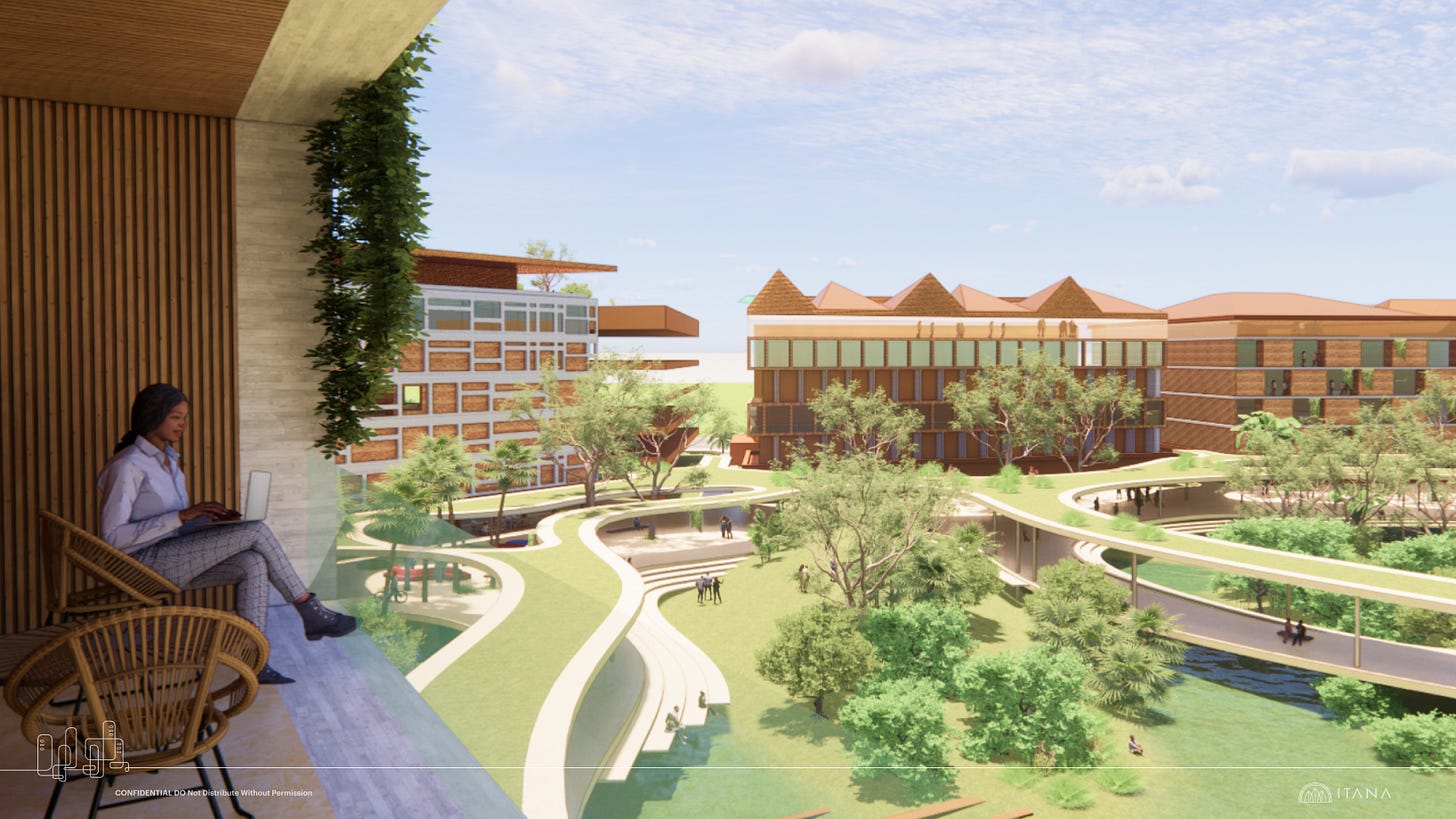Covering topics from urban mobility and architecture to interior design and dream homes, a newsletter that reminds us where we are matters.
Happy Holidays from nyc ⛄
This time I’d like to share some learnings from my work this past year.
The topic of this newsletter is built upon the idea that where we are matters more than we realize. Our thoughts and behavioral patterns are largely dictated by who and what is in our physical environment.
That was the genesis of what led me to this project: Itana (aka Talent City) — building that enabling environment for tech to thrive in Africa.
In the spirit of closing out 2022, I want to share my experience and takeaways from building a startup city.
As always, feel free to respond to this email with any comments or to say hi.
ps. I plan to do more writing in 2023. That may actualize in a writing group that meets at the Met biweekly, let me know if you’re interested in joining in-person or digitally via a dm 😊
Itana is a startup city for the innovators and builders of Africa with the mission to unlock Africa’s digital economy by combining digital governance, like-minded community, and infrastructure for the future of live and work.
—
In April 2021, I reached out to Iyinoluwa Aboyeji to help build Talent City (now known as Itana). I didn’t know what to expect; it was faith in building alongside a team that I respect and an instinct that city building is the space I want to be in for perhaps the next 50 years of life to come.
Fast forward to today, we made many mistakes but also hit a number of milestones. To highlight some of the things I learned —
Start with policy
One of the biggest mistakes we made is starting with land. When E & Luqman started the company, they spent a lot of time and resources trying to acquire land in Tinapa. The thought process was that to build a charter city, you must have land. To an extent, that was true. The law prescribes that to operate in a Free Zone capacity, a company needs to have an interest in land.
However, through partnering with the government and private investors (thanks to Luqman), we were able to create a digital free zone with operating guidelines custom designed for global technology and service-oriented companies. A smaller startup or individual that exports services will not have to pay thousands of dollars to register for a business license in the Free Zone (a system that made sense for manufacturing). A global company can expand into the country without having to pay the Nigerian Significant Economic Presence tax.1
Dubai and Shenzhen of the world all started with good policy and share the commonality of starting in special economic zones. For us, to enable Foreign Direct Investment (FDI) – a requirement that enables investment in physical infrastructure – we start with policy and governance.
Itana master plan by NLÉ
Find a co-developer
We spearheaded the development project and invested in feasibility and urban planning.
In real estate terms, feasibility means “the analysis and research conducted to ascertain if the proposed property development is viable given the proposed location and the various conditions impacting the project.”
Testing for viability in tech may mean building a minimum viable product and putting up a landing page. In real estate development, it entails spending hundreds of thousands of dollars working with professional financial advisory, development management, and master planning firms to create an investment memorandum to then possibly obtain development financing.2
Ideally, one finds a co-developer who will contribute to some of the pre-development costs (estimated at around $3-5m for our project of 72,000 sqm) along with a financing partner who will have the ability to provide sufficient funds and network for construction.
We made mistakes and experienced numerous delays to our timeline. When asked, “Would there have been a better way to do it?” E’s only response was:
“It got us where we are.”
Our digital residency community.
Build a community
What’s something we did right? We built a community – a group of ambitious believers building for Africa’s future.
To them, Itana stands as hope; it is hope for escaping their current unproductive environment and having a more functional place to operate in.
We started with building an informal advisory council; the strength lies in the minds of these amazing builders and innovators. We then built a waitlist of 3,000+. The ones that believed in us a little more formally became digital residents,3 the first step to becoming a physical resident and accessing the virtual business license. We believe that it’s important to design alongside a passionate group who have skin in the game of the future that we’re building.
I think that for any brand, the ability of people to find each other is always important. It doesn’t have to be exclusive; it’s simply finding those that share similar interests and activity patterns – in our case, building, running, or expanding a business in Africa.
Side note: Itana will also have a fund that invests in the startups in the community that will live, work, and participate in the city’s accelerator programs. And we hope to see the success seen in Singapore’s sovereign wealth fund.
In Lagos, Nigeria, many need to travel great distances – 2.5 hours one-way commute to a place with good Internet. We will build a tree-filled live, work, build district.
Find focus
We are trying to solve a big problem and constantly face the challenge of staying focused.
With the mission of unlocking Africa’s digital economy, priority and order of operations are critical to avoid running into the risk of building multiple products at once with a rather lean team.
Most of 2022 was spent laying the ground for infrastructure. We prioritized it because we did not want to start spending resources building the digital product before a formal partnership with the Nigerian government (NEPZA) is concluded. Additionally, even a “small” project of our size will take about ten years.4 It’s important to lay the groundwork for the piece that will take the longest time to complete.
We are a startup city after all. It only makes sense that while we enable FDI and build digital infrastructure, we can promptly realize the dream of the physical reality.
Sometimes I wonder if we are a tech startup; no in that finding success lies less in finding product market fit but more in the ability to find financing along with the quality of execution; yes in that it has the largest potential to scale.
Personal growth
Through building and getting to know the problem space more intimately, my why for Itana changed over time.
Initially, I joined the project because of a personal mission statement – to design physical spaces that enable us to be the best version of ourselves. It still is very much a strong belief: the fact that we are made up of micro-units of behavioral patterns directly affected by our physical environment.
Being closer to the problem, I learned that Nigeria and Africa’s challenges cannot be solved by fancy architecture alone. They go beyond the incremental improvements we see in the US. It requires foundational changes from hedging against currency fluctuations and gaining reliable electricity and ICT infrastructure.
Enabling foreign direct investment for tech, according to one of our partners, serves as “the foundation for catalytic economic growth.” Africa witnessed the fastest growth in tech. In 2020, the ecosystem raised over $1.4b USD in venture capital; the figure jumped to $4.6b in 2021 and is projected to hit $7b this year.5
It’s not about building one model city, it is creating the parameters that will enable millions more to build the hundreds of cities to come.
Thanks for reading and have a wonderful holiday 🎄
Coco
Curious to follow our journey with a front-row seat? Become a digital resident.
Special thanks to E, Luqman, the team, our community, and our existing and soon-to-be investors for believing.
Often results in double taxation for global companies operating in Nigeria (more info here).
In our case, we spent about $280k over the course of 2022.
Each paid $100 to be a part of the journey.
Based on our feasibility study, the 17-acre project will be home to up to 3,000 residents. However, Phase 1 of 600 residents will take ~18mo.







